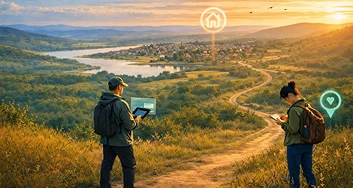Data is important for DMOs. Traditionally, marketing and branding has been the focus of budgets, but data management has now become a priority. Smart data is the road to better insights and choices that will help Overijssel (in the eastern part of the Netherlands) to become a sustainable destination faster and better.
Importance of data
Decisions tend to be made based on intuition, but data can be used to support argument. The DMO also helps businesses to understand and use the vast volumes of data that they have at their disposal. In the past, economic data was considered the most important since this helped justify the value of tourism for destinations and the reasons for financing DMO budgets. However, social impacts and perceived overtourism then increased in significance and became a game changer for monitoring tourism's impact.
Currently, DMOs monitor descriptive analytics looking at what happened in the past and use this data for decision-making. However, there is also some predictive analytics looking into what will happen in the future and monitoring visitor streams and using real-time data where available. Marketing Oost have a desire to use prescriptive analytics to become a smart region and achieve the desired objectives, however, the province doesn't share this ambition.
Predicting the Future
In 2019, MarketingOost launched a report with seven predictive scenarios:
- New financial crisis
- Decrease in the numbers of staff
- New agriculture
- Positioning Overijssel as a health destination
- Techno detox
- Less reliance on aviation
- Changing climate
People didn't think the scenarios were realistic, but all of the scenarios came to fruition, proving that data can be used to predict the future.
All of the disruption from COVID and the lack of additional budget, meant that it was important to make quick decisions. In the past, economic data was primarily used, but with changing priorities within the destination, social impact and climate change data helped to answer how visitors can bring more benefits to different aspects of local communities, such as improved transport systems. MarketingOost decided to keep a strong leisure base since the data was already available and stakeholders expected this perspective to be strongly considered. The DMO also uses this economic data to run comprehensive analysis to match their segmentation models.
MarketingOost saw the importance of being prepared for the future, using new social impact data. However, the DMO doesn't currently have a lot of the desired data to answer the different questions posed by tourism businesses and local governments. MarketingOost aim to organically grow their database with new types of data and look for funding opportunities and pilot projects to join. When using new data sources, MarketingOost pilots the project in a specific municipality and after successfully generating valuable data, the project gets expanded across the region.
MarketingOost also motivate stakeholders to become more data-driven and encourage them to share the data they have at their disposal. MarketingOost attempt to create alliances and work with nature and cultural organisations, the province and local municipalities and created a Data Hub to collect data and help with visualisations.
Using Data
As part of their strategy, MarketingOost also create new tools and help educate stakeholders on turning data into insights through analysis, visualisations and communication. An important aspect is educating stakeholders about data management so that they are aware of the data available and how it can be used.
There are multiple uses of data. Data shouldn't just solve one issue, but incorporated across the larger scope of destination management. The province and local businesses have different questions about tourism development, but these can be connected to consider various aspects of destination development that meets the needs of all stakeholders and helps with mitigating potential conflicts.
MarketingOost's strategy is called "Beg, Share and Borrow" as they try to encourage the exchanging of data with other organisations. They also work with other companies that are conducting research that MarketingOost doesn't have the budget for themselves and also encourages local municipalities and the province to join projects that could help broaden the database. Sharing is the most important aspect to have mutual benefits between organisations.
MarketingOost use the general data model. Data given context becomes information, which with meaning becomes knowledge and with additional insights becomes actionable insights. Data and information is generated by information systems, with knowledge and actionable insights created by MarketingOost's staff. These actionable insights help to improve the destination, become balanced more quickly and improve the segmentation and the destination's tourism offering.
.webp)





















.webp)
